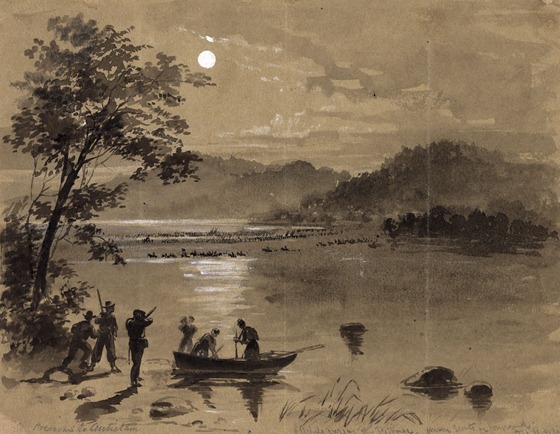Tuesday, 16th.—Marched twenty-two miles and camped one mile north of Williamstown.
Sunday, September 16, 2012
Title: Previous to Antietam. Rebels crossing the Potomac. Union scouts in foreground.
Signed lower right: Alf. R. Waud.
Title inscribed below image.
Library of Congress image.
SEPTEMBER 16TH—Intelligence from Missouri states that the Union militia have rallied on the side of the South.
September 16th, Tuesday. Fell in at daylight but remained in position, much to the surprise of everybody. Shortly afterwards an artillery duel commenced, which continued throughout the day. The enemy have an immense number of guns in position, apparently more than we have, and are liberal in the expenditure of ammunition. So far as our own regiment is concerned it had no effect, we simply lay on our backs and speculated as to where certain shells would burst as they went rushing over our heads. But one cannot always attend to one’s own business and the temptation to note the effect of batteries in action is very great. Frequently several of us crept to the top of the hill and there glass in hand, watched the flight of the twenty pounders shell and marked where they struck or exploded. Unluckily these big guns proved almost useless, three of them blowing away their muzzles whilst I was in the battery, of course disabling them. They are made of cast iron with a wrought iron jacket at the breech and are evidently not strong enough for guns of this calibre. The ten pounders of which we have a great many are all right and very popular.
Nothing occurred of interest on our front until towards evening, when Jack Garcon, an O’Malley type of Irish dragoon, aide-de-camp to General Meagher, amused the troops by a display of horsemanship on the top of the hill, in full view of the enemy during the hottest part of the cannonading.
On the right, however, towards evening Hooker crossed and engaged the rebel left, doing a good deal of fighting.
September 16.—I arrived at Chattanooga this morning, about 5 o’clock, having left Dalton on the 15th. Mrs. T. arrived there before I left. Her son was much overcome at the sight of her. Mr. and Mrs. Davis were very kind to me, as was also their niece, an interesting young girl, who had just lost a brother in the service. Mr. D. has two sons in the army. I stopped at Ringgold on the way up. Mrs. M. and Mrs. W. had preceded me, and we are now in the Newsom Hospital. It is a very large one, having been enlarged to double the size it was when we visited it before. The part we occupy is opposite to the wards we formerly visited. We have each a ward assigned us. The house our room is in was a large hotel; Mrs. M. takes charge of it. On the south side is another ward—Mrs. W. in charge—formed of two two-story brick stores; on the north corner is a large brick house three stories high—was a private boarding-house — which is to be under my especial care. It is quite a handsome building. I am much pleased with my portion.
We have a good many patients. One man, by the name of Hughes, died in my ward this morning. He was a member of the Sixteenth Louisiana Regiment. I hope this is not ominous.
We have nothing to cook on but one small stove, and that a smoky one. It cooks for the whole of this side of the hospital. We have nothing to give the men to eat but wheat-bread (very nicely made at the government bakery), fresh beef, rice, tea, and coffee.
We have had no reliable news from the army since it went into Kentucky. A report came a week or two ago that it had reached Covington, and was about to shell Cincinnati. This good news we are almost afraid to believe.
September 16.—Major-Gen. O. M. Mitchel arrived at Port Royal, S. C, and assumed command of the department.—A grand Union demonstration took place at Jefferson City, La.—Paynesville, Stearns County, Minn., was attacked by a party of Indians, who retired after burning one house and committing other depredations.—St. Pau’s Pioneer, September 20.







